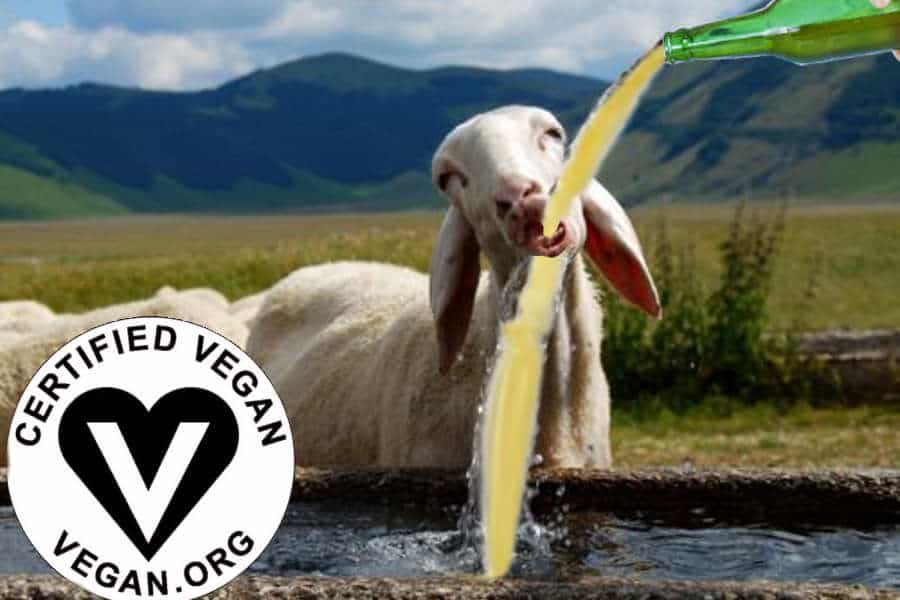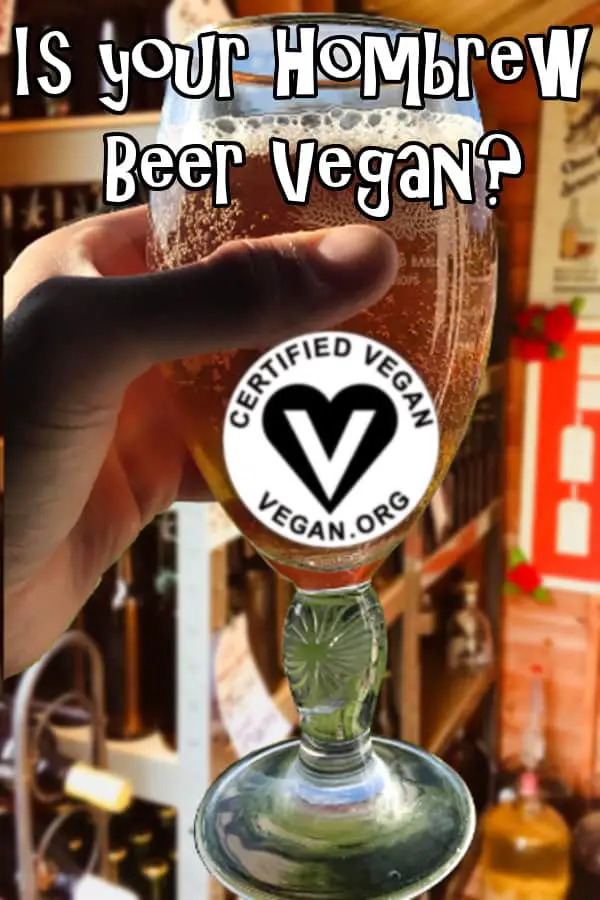Panic. A vegan is coming to dinner and you don’t know what to drinks you can serve them. My brother and his entire family went Vegan recently due to my niece’s allergies (Yep, I know, but just bear with me.).
Personally, I knew very little about this dietary choice and was stumped to know if he could still drink my homebrew. So I did some research.
So, can you serve a vegan your homebrewed beer or any other commercial beer? As a general rule, all beers are made from vegan-friendly ingredients (Malt, hops, water, & yeast). Most beers are also now filtered using modern systems, so they remain vegan-friendly. However, if the beer has been treated with beer finings for its clarity, then it may no longer be vegan-friendly.
So, on the face of it you, it is much easier to determine if a commercial beer is vegan or not because they are required (in most countries) to clearly display this on their label. Nowadays only more traditional brewers use substances to improve the clarity of their beer, most use a sophisticated filtration system. (buy beer from local breweries)
However, this cannot be said of most homebrewers. Most of them probably aren’t aware of what they are treating their beer within the latter stages of their brewing process. I know that I wasn’t aware until recently.
So, how can you be sure that you aren’t misleading your vegan friends and family and giving them something which they wouldn’t allow themselves to drink? Read on and find out everything you need to know about vegan beer!
Which beer ingredients are definitely vegan and why?

Beer is an incredibly natural drink and has very few additives, especially when it is brewed at home. The basic ingredients being malted barley (most common), hops, yeast, & water. (shop for your brewing ingredients on homebrewing.org).
Malt
Although beer can be made with anything from wheat to rice, the most common malt type is barley. As far as I’m aware no animal products or animals themselves are used in the cultivation and treatment of barley (or any other grains) destined for the boil kettle. So, a good vegan product if ever there was one.
Hops
Hops are the flower that gives beer much of its bitterness as well as much of its aroma and taste. Hops are extremely vegan in the sense that they aren’t produced from the use of any animal either intentionally or naturally.
Most varieties of hops aren’t even pollinated by bees, they rely on ‘wind pollination’. An interesting note here is that some of the most popular vegan millennial trends such as avocado toast aren’t actually vegan-friendly as avocados rely on migratory beekeeping practices. No such issue with hops though.
Yeast
Now this one is tricky. Yeast is in fact defined as fungi yet some people view it very differently to the common mushroom. Although this single-celled organism is definitely not an animal, some vegans may choose not to consume it, but this is a very small group.
As a general rule, if your vegan friend eats bread, then they shouldn’t have an issue drinking a yeast produced beverage. To be honest, it may just be a case of educating a few people so that they know what yeast is exactly.
Water
100% vegan (Thankfully!).
The quick test: Is my beer vegan?
As long as your beer only has these four ingredients in it (malts, hops, yeast, & water) your beer is 100% vegan-friendly. If you choose to drink your beer without any other additions or treatments to it and it is nice and cloudy, then you should be confident in the knowledge that you are serving your guest a vegan beverage. However, if you take any further steps, then you may be introducing a non-vegan ingredient into your prized beer.
Which processes in beer brewing aren’t vegan-friendly?
Once a brewer starts adding additional ingredients to their brew other than malts, hops, yeast, & water, they are entering the non-vegan zone. The most common reason why beer is not vegan-friendly is if it has been treated to improve its clarity.
In years gone by the clarity of your beer didn’t matter. Peasants and lords alike drank their ale from earthenware pots or tankards. When glass became affordable as well as fashionable, people no longer wanted to drink cloudy beer. This is where fining came into play.
Just as with famous Bordeaux (and other) red wines are treated to make them clearer in appearance, so too is beer.
Beer is cloudy due to the presence of yeast, proteins, and polyphenols which are suspended in the liquid. By adding positively charged particles (for the most part) to the beer these impurities (negatively charged) will be attracted and then pulled down by a fining substance.
Unfortunately, most of the solutions used are derived from animals. Although most of these substances are left in the bottom of the fermenter or vat, there can still be trace amounts in the beer itself.
Also, the practice of filtering beer by commercial beer companies often requires a fining process beforehand. However, you can still find beers that have excellent clarity and very vegan qualities, so read on.
Which beer ingredients aren’t vegan and should be avoided (for vegan beer)?
Isinglass
If you are using Isinglass to improve the clarity of your beer (more common for commercial beers) then you are in fact working with collagen which has been extracted from the dried swim bladders of fish. It’s extremely effective in making both beer and wine clearer but isn’t vegan. So, if you have used this type of fining substance then you can’t serve your homebrew to your vegan neighbor.
Gelatin
Ordinary gelatin, as used in cooking, is a fairly effective fining substance and is used widely in improving the clarity of fermented alcoholic drinks. However, gelatin is normally made of collagen sourced from animal products. Therefore, if you are using gelatin in your homebrew it isn’t suitable for your vegan friends to drink.
Also….Honey
Although not used as a fining substance, honey can be used as a substitute for sugar used in priming beer for bottle conditioning. The honey is then consumed by yeast which transforms it into ethanol and CO2. As honey is produced by beautiful bees, it isn’t a vegan product and you shouldn’t serve that beer to a vegan. (insert bee pun here….)
Vegan-friendly finings substances
Luckily, not all the substances we use for fining beer is non-vegan, so there may be home for you yet!
Irish Moss
Irish Moss is actually a seaweed (OK, let’s just move on). It is, therefore, a plant and is totally vegan. It can be used to remove proteins and other impurities which affect the clarity of your beer. Again, it’s all achieved by the science of positive and negative charged particles being attracted to each other.
So, if you are planning to brew up a vegan-friendly batch of beer then reach for Irish Moss or Whirlfloc Tablets which contain the active ingredient carrageenan which comes from red seaweed.
Bentonite
Bentonite is a clay that comes from volcanic ash and has been used in clarifying wine and beer for more than a century. As a natural mineral based product, it is 100% vegan and you should be safe to use this when producing vegan-friendly beer. The fact that this is the same substance used in kitty litter is your own mountain to climb, I’m not going to pass judgment.
Silica Gel
Silica Gel has been around for nearly 500 years and is a substance made from silicon and oxygen atoms. It’s great at absorbing other materials and has a wide range of uses. For beer fining it is both safe and vegan-friendly. So, don’t hesitate to use this as a fining substance when you have to be conscious of the addition of animal products in your beer.
Polyclar AT
Also known as Polyvinylpyrrolidone or PVPP, this is a finely prepared plastic which is extremely effective at bonding with impurities in your beer and improving its clarity. As a plastic based product, it is of course vegan.
Whether or not it is actually good for you is debatable. It is widely used in many different industries but you should do your own research before using this product in your beer. As a general guide, it isn’t going to do you too much damage is consumed orally.
Alternative fining methods
The most attractive thing about most of the fining substances I have mentioned is that they work extremely quickly. However, you can avoid using any of them and just cold condition your beer.
Cold conditioning
By storing your finished beer at a temperature of 32 °F (0 °C) for up to seven weeks you will be able to produce very clear beer without the haze from proteins or other impurities. But it does take time and involves the correct type of equipment to keep your beer chilled for that length of time.
For most beers, whether ales or lagers, this process can really help improve both the appearance and flavor of the beer without the need for non-vegan ingredients.
Commercial beers which aren’t vegan-friendly
As I mentioned before, most traditional breweries used fining substances which aren’t vegan-friendly, particularly Isinglass. As a general rule, you can treat most British beers as being non-vegan (unless otherwise stated) whereas most German and Belgian beers are vegan because of the beer purity laws in those countries.
Here is a list of some vegan and non-vegan commercial beer companies:
Beer Brand | Vegan-Friendly? |
|---|---|
Abita Brewing Company | 100% vegan |
Amstel & Amstel Light | 100% vegan |
Corona | 100% vegan |
Heineken | 100% vegan |
Magic Hat | 100% vegan |
Michelob * | 100% vegan |
Mike’s Hard Lemonade | 100% vegan |
Miller Brewing Co. | 100% vegan |
Redhook Ale Brewing | 100% vegan |
Roque Ales* | 100% vegan |
Rolling Rock | 100% vegan |
Santa Cruz Ale Works | 100% vegan |
Trader Joe’s Brand Beers | 100% vegan |
Brooklyn Brewery | mostly Vegan** |
Coors | mostly Vegan ** |
Dogfish Head Brewing | mostly Vegan** |
Samuel Adams Brewing Co. | mostly Vegan** |
Thirsty Dog Beer | mostly Vegan** |
Fosters | non-vegan |
Guinness Stout | non-vegan |
Lighthouse Brewing Co. Inc | non-vegan |
Moorhouse’s | non-vegan |
Murphy’s Irish Stout | non-vegan |
Sol | non-vegan |
Wooden Hand Brewery | non-vegan |
* except for honey beer varieties. ** check each beer. Full list of vegan beers available here
(buy beer from local breweries)
Which other drinks around the house aren’t vegan?
If you are expecting vegan guests then you may also be worried that the food or other drinks you serve in addition to your beer may not be suitable. Generally, people with particular dietary needs are quite chilled out about small mistakes when offering them food, but you want to avoid giving them something without their knowledge if you can help it.
Wine
For the same reasons as beer, wine can sometimes be unsuitable for vegans. Many of the same issues in achieving clarity in beer affect the process of wine production. Winemakers use many of the same substances as beer brewers to achieve clearer wines as well as other traditional products such as egg whites. Nowadays most wines will clearly display if they are vegan-friendly or not, but check the ingredients just in case.
Soda
Some sodas are also non-vegan because they contain Ester Gum. This is a product that is used to thicken or stabilize the soda and relies on animal-sourced glycerol. Again, check the label when in doubt and as a last resort, simply show the product to your guest and let them decide.
Juice
Some juices can contain animal products, especially those which are high in omega-3 oils, which have been extracted from fish for the most part and added to the drink. Some juice also has gelatin derived from fish too. While this isn’t going to harm humans, it’s not in keeping with a vegan diet. So unless your beverage is 100% fruit juice then consult the ingredients for more details.
So, should you serve your homebrew or any other beer to a vegan?
After reading this article you can see that there is a risk that some beer isn’t going to be suitable for a vegan guest. However, the main problem is how the beer is treated after it has been brewed.
Commercial beers are very aware of the special requirements of their vegan customers and generally make it very clear what is in their beer. You can be confident that if it is declared as vegan-friendly, you can serve that beer to your guest.
When it comes to homebrew beer, after reading my article you are in the best position to know if your beer is vegan or not. After all, you are the one who made it with your own two hands. Assuming that you have not used any adjuncts and have used traditional ingredients (malt, hops, yeast,& water), then your basic product is vegan.
Go back and review how you treated your beer to gain the best clarity and which fining substance you used. If you used a fish based or gelatin based fining ingredient, then keep that brew to yourself. If you used any other type of fining method, then you have probably produced a vegan-friendly beer that everyone can enjoy.






